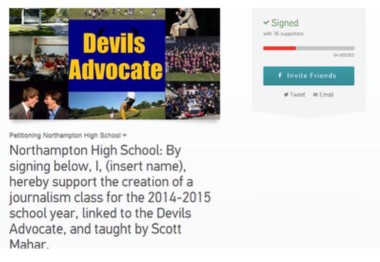Revolution Catching Fire?
T he Hunger Games: Catching Fire may be a big-budget film that made over $670 million in its first two weeks at the box office, but that hasn’t stopped economic justice activists from using its story to highlight their inequality concerns.
“Enough with the distractions,” urges a video posted on the website OddsInOurFavor.org. “The Hunger Games are real.”
The movie, based on the best-selling young adult trilogy by Suzanne Collins, takes place in the dystopian society Panem, where a small percentage of the population controls a large percentage of the country’s wealth, while the majority of citizens face the constant struggle of economic insecurity—a situation that is not unlike our own society, activists point out, where “[one percent] of the population controls 40 [percent] of the country’s wealth,” as the video says, while “80 [percent] of the population controls just [7 percent] of the country’s wealth.”
The website includes a photo montage of various Hunger Games fans giving Panem’s revolutionary three-finger salute, and urges others to join them.
But it’s not just young adult readers and apparent 20-something basement dwellers highlighting the story’s economic commentary. In a recent interview with The Guardian, longtime actor Donald Sutherland—who plays the tyrannical President Snow in the onscreen adaptation of the Hunger Games trilogy—said he wants the film to inspire a youth revolt.
“Hopefully they will see this film,” Sutherland said, “and the next film, and then maybe organize. Stand up. They might create a third party. They might change the electoral process. They might be able to take over the government, change the tax system.”
Fighting for a Journalism Class
With jobs in print journalism often low-paid and newspapers closing all over the country, you’d think young people would hardly see newspaper work as the road to a prosperous future. But a Northampton High School student, Jonathan Goldman, has started a movement to get NHS to reinstate a journalism class, something the school has not had for about 10 years.
Goldman is editor of the online NHS newspaper the Devil’s Advocate (https://sites.google.com/a/northampton-k12.us/devilsadvocate), which had been silent for six years until he revived it last fall. The paper contains thoughtful pieces, such as a column on cheating in which staff writer Sophia Gerstle asked why young people are outraged when prominent sports figures cheat but are generally apathetic about cheating in school. Such articles give credence to Goldman’s rationale for enlisting 500 students—more than half the student body—in a petition drive aimed at getting the administration to put journalism back into the curriculum: that a journalism elective would teach students to learn, to investigate, to engage with readers.
Journalism studies in high school are under multiple threat today: from budget cuts, from the shrinking of the traditional newspaper business, from confusion about how they should proceed as print gives way to digital media, and from paternalistic administrations that prohibit students from writing controversial stories (the latter threat is not new). Yet as recently as 2011, 88 percent of public high schools offered journalism or publication courses, according to Kent State University’s Scholastic Journalism Census.
By the Numbers
That’s the amount the state of Massachusetts spends on motel rooms to shelter the homeless, up from $1 million just five years ago—in 2008, the first year of the recession. Under the mantra of “housing first,” the state pumped over $14 million more than the previous year into this year’s homelessness prevention programs, but also laid down strict criteria for eligibility for aid (eviction and abuse cases, for example, must fit within relatively narrow guidelines) that homelessness activists warned would leave many families out in the cold.
Worth Quoting
“Nobody ever told Howard Dean to get out of the race because John Kerry was running. What law dictates that there can be only one woman per major race at a time?”
—Hanna Rosin in Slate, on the fact that attorney Juliette Kayyem is running for governor of Massachusetts at the same time Attorney General Martha Coakley is running. Kayyem is a former Assistant Secretary for Intergovernmental Affairs at the federal Department of Homeland Security (see story, page 7).



